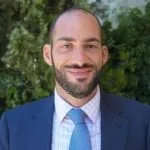
By Samuel Burke
Confusion. Disbelief. Denial.
Those were the emotions cutting through me as I looked at my dad’s DNA results. We come from a small Phoenix Jewish family, but this at-home test was showing a big discovery none of us could explain.
“Dad, it says you’re Mormon.” Words I never thought I’d utter. My father’s response shocked me even more.
“I know,” he said as my eyes widened. “I saw that when the results came in. But it’s so preposterous that I just ignored it.”
You can ignore DNA results, but that doesn’t make them go away. The test classifies my dad (and by extension me) as “Mountain West Mormon Pioneers.” We had no idea a scientific test could tell if someone comes from a relatively-new proselytizing religion like the Church of Latter Day Saints.
I was determined to solve this mystery, but the deeper I dove into it the more I realized our lives would never be the same again. When I finally untangled the web, my heart broke as I watched the DNA test steal a part of my dad and his identity. We’re still Jewish, but my father’s paternal lineage was not at all who or what he’d always believed.
“It changed my whole perspective on who I was,” my dad admitted, referring to his identity in the past tense.
At-home DNA testing has become commonplace in the United States and this nearly $10 billion market is now taking off around the world. But there’s a secret side to these kits which the DNA industry doesn’t like to talk about.
Experts find that as many as 11% of people who take a DNA test discover that one of their parents is not their biological parent, according to the American Journal of Physical Anthropology. This sounded ridiculous to me — until it happened twice in my very own family.
The advertising for DNA testing focuses on positive stories of people who were seeking out answers about their ethnic backgrounds. They don’t spotlight families like mine whose lives are turned upside down by a simple swab of the cheek.
For my family, the DNA test wasn’t just adding a new chapter in our lives. It seemed as though it was rewriting our life story. After my mom sent in her sample, we received a cryptic email from a woman whose family also attended Congregation Beth Israel. As I read the stranger’s email, I realized the woman was insinuating she and my mom are sisters. When I found a picture of the woman, my jaw literally dropped. My mom took one look at the photo and made a blunt proclamation.
“Well, we don’t need a DNA test. She’s obviously my sister,” she said as she stared at her new younger sister in amazement.
A third DNA shock brought my family closure to the case of a missing cousin who disappeared in the late ’80s. We believed he had died from AIDS, but learned he had met a different fate.
The DNA test began adding and subtracting the people I called “family” so quickly that I started questioning the very meaning of the word. Are family the people who you are raised with? Or the people you’re related to?
I began documenting my family’s own journey as well as a dozen other families around the world whose lives were torn apart and put back together by DNA testing. Two years of listening in on these families’ roller-coaster journeys is now a podcast called “Suddenly Family.”
Infidelity. Blackmail. Murder mysteries. Kidnapping. Clandestine artificial insemination. These families have experienced it all. Their DNA plots sound more like blockbuster thrillers, but behind that are the emotional firsthand accounts of people who’ve had to pick up the pieces of their lives and start all over again.
What type of relationship do you owe a relative stranger you had never met before the DNA test? What happens to the close family you no longer share a bloodline with?
These were the questions I needed answered and the families who let me listen in on their most intimate DNA moments truly provided them.
I learned more about what the family I’ve had all my life means to me after developing relationships with my newly-discovered family.
Now that the dust has settled, my dad summarizes what this gut-wrenching DNA experience has meant to him: “It’s now just a matter of fact,” he said. “It’s not good. It’s not bad. It just is.” l
Samuel Burke is a three-time Emmy Award-winning news correspondent, Arizona State University graduate and Phoenix native. He now lives in London and is the host of the podcast “Suddenly Family.”






